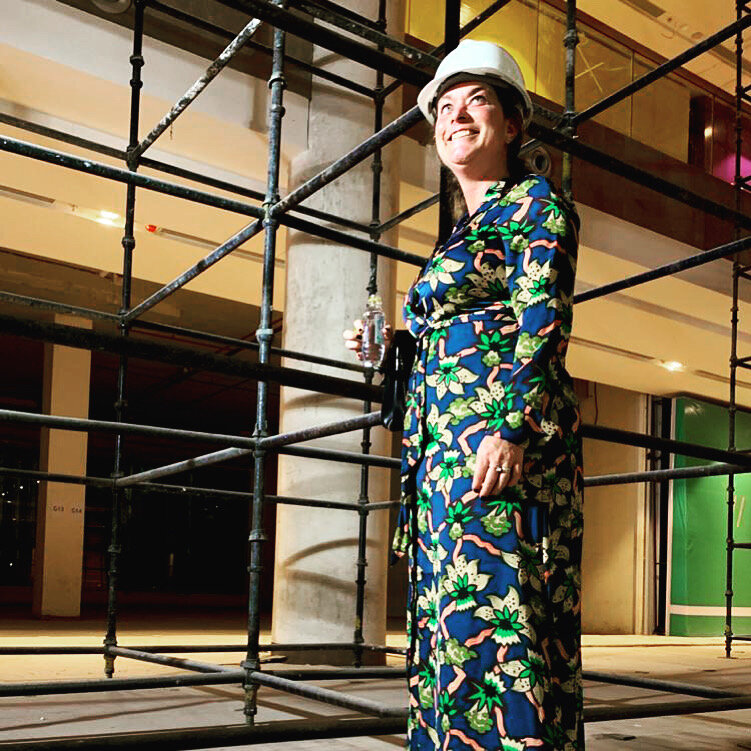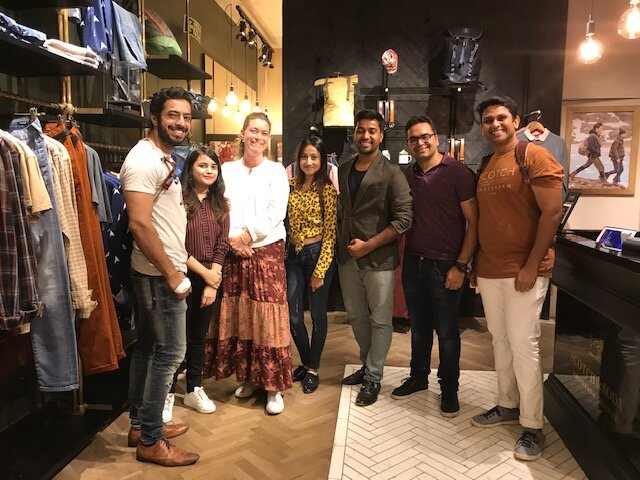The Dutch clothing brand Scotch & Soda is on the rise internationally. The clothing is now sold in almost 90 countries, including India. Scotch & Soda's goal there was to open two new shops a year. After three years, the counter stands at eight. "It's going extremely fast," says managing director Richelle Eijkens. "That is because we have found a very reliable partner in Reliance. We could not have wished for better cooperation in India."
Managing Director for the rest of the world for Scotch & Soda
Richelle Eijkens
It is not the first time that Richelle has worked with retail giant Reliance. As International Franchise Director for Hunkemöller, she had already sat down with the Indian company to discuss the entry of the Dutch lingerie brand in the Indian market. But for Scotch & Soda, Richelle is now working closely with Reliance and that is going well. "It still surprises me sometimes how controlled the management of our brand is in India, you expect differently at first. There are still many prejudices about emerging Asian countries. That it would be backward, that communication would be difficult, but nothing is less true. Reliance is very professional. We really are partners.
Working with the retail giant of India
Reliance is India's largest company and is ranked 106th in the Fortune Global 500. Originally engaged in producing polyester, the multinational now moves into many areas. It has a telecom branch, it is one of India's largest petroleum companies and since 2006 it has been one of the major players in the Indian retail market. And in that market, it is rapidly rolling out new concepts, such as the new chain to department stores 'The White Crow and the newly announced e-commerce platformThe company is also rapidly rolling out new concepts in this market, such as the new chain on and chain off, which will compete with Amazon.
"Their business model is to get good concepts from abroad and introduce them to the Indian market. They have a special subsidiary for that. They specifically look for interesting, international brands and they also saw potential in Scotch & Soda." According to Richelle, this is also one of the reasons why Scotch & Soda referred to India as 'a crucial market' in an interview with Forbes. "In Asia, India is our most important market and that's really because of the quality of our partner. We both see the potential and it is being exploited. In Japan and China, we also see that potential, but our partners there are not yet fully exploiting it."
Richelle Eijkens with a Scotch & Soda team in India
The price cannot go up, it can always go down'.
But Reliance's ambition has also resulted in challenges, Richelle says. "We are positioned higher in the market in India than in the rest of the world. Comparable to a brand like Tommy Hilfiger. This is mainly because of our higher production costs, but Reliance wanted to take the gamble with us. Take polo shirts for example, they are much more popular in India than in the Netherlands. But the Indian man wants something more than a simple shirt. Our clothes have that little bit extra, like a different collar or they are made of a more special fabric. That is why Reliance decided: we are going to try it at this higher level, the price can always go down."
And that step has now been taken. After comparing, trying out and analysing, the conclusion is that with a lower price, sales immediately start to increase visibly. "One of the reasons is our production route. We partly produce in India, but those products are not specifically for the Indian market. Everything first goes out of the country to our hub in Hong Kong and is then imported back into India. This creates high costs that other brands do not have. We are therefore re-examining our business model."
Letting go of the reins
Meanwhile, Scotch & Soda in India is growing steadily. This year, the eighth physical shop will be opened and Richelle expects three or four more to be added in the coming years. "From the Netherlands we are always very involved in the establishment of a new shop, because the experience of our brand in that shop is extremely important. But in India, we have made some exceptions. Reliance is very good at local sourcing, so almost all the materials for the stores are produced locally." This, according to Richelle, has been preceded by quite a process. "We want to control everything ourselves, which was not easy in the beginning. But now that we have met all the suppliers and looked at every sample, we can give them more freedom."
Reliance gets this freedom in more areas, including marketing and online sales. "Normally we do not give away e-commerce rights to partners, but Reliance understands the market much better than we do and also has a very good distribution network. Besides, their contacts are unmatchable; we hang in the best shopping malls because of them, are carried by important influencers and appear in influential magazines. The amount of attention they have for us is extraordinary."
Scotch & Soda opens its 8th branch in India this year
The right local partners are crucial for a successful start in India
Having a good and reliable local partner is therefore the most important tip Richelle would like to give to companies that are cold starting out in India. "I have already had my first appointments made by a consultant who has put me at the table with the right people. The workplace is still very hierarchically organised in India, so if you meet with a manager who doesn't have the authority to close a deal with you, you may have a nice conversation, but you won't get anywhere."
The fact that the same consultant could quickly guide Richelle through the city between appointments, knew where she could eat well and stay in the best places, also made the work a lot easier. "I'm always wrong about the amount of work I can do when I'm there. Everything just takes much more time. Besides, it is always a question of whether they will come back to the agreements they made. But that's part of the culture, you shouldn't nitpick about that."



